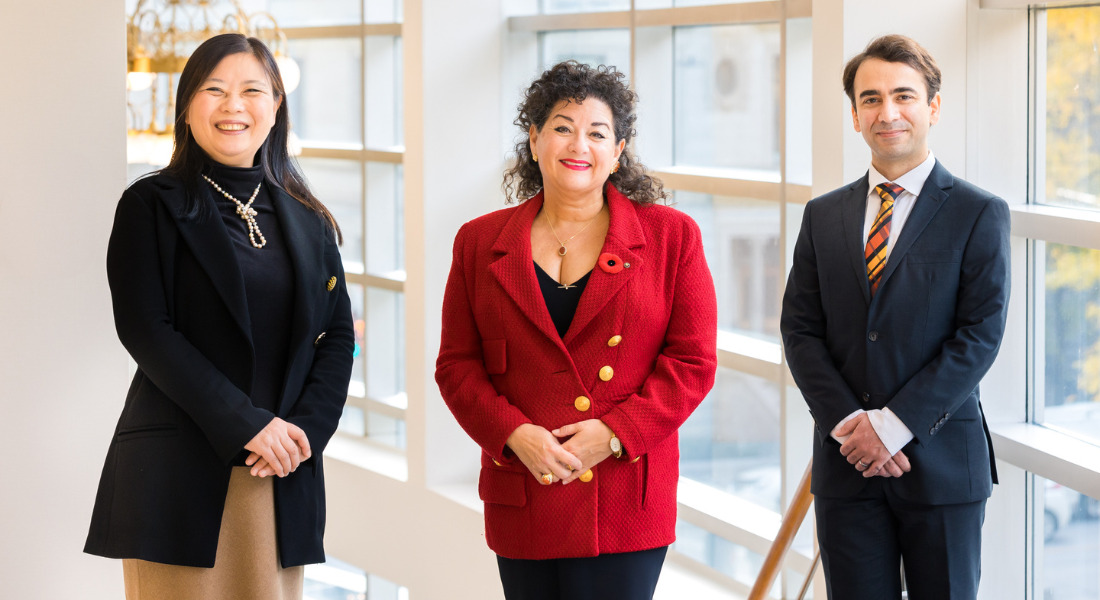His composition will receive its premiere at the AMP concert on Oct. 20 next year, performed by the Orchestre Métropolitain, under the baton of Yannick Nézet-Séguin, at the Maison Symphonique de Montréal.
“I can’t wait to work with these terrific musicians, and to use this platform to tell the story of a millennia-long shared heritage between the Persians and the Jews,” Habibi said.
Shirazi adapted the stories told in the Torah to poetry, totaling tens of thousands of couplets in Judeo-Persian, set to typical Persian rhythms. This was a culture that upheld poetry as a powerful form of communication and education.
Habibi has given himself the task of creating a 20-minute song cycle based on Shirazi’s texts, sung in Farsi, the language of modern Iran, in a typical Persian style by a vocalist of that heritage.
“The Azrieli Commission for Jewish Music is awarded to encourage composers to creatively and critically engage with the question, ‘What is Jewish music?’ said Sharon Azrieli, the foundation board member who is the visionary behind the biennial AMP and is herself an accomplished soprano.
In addition to the expert jury’s appreciation of Habibi’s artistry and technical mastery, Azrieli said, the proposed work “will show the close affinity that has historically existed between Persians and Jews dating as far back as the 6th century BCE. Today, this shared history and affinity are obscured by the political relationship between Iran and Israel.”
A pianist and holder of a doctorate in music from the University of Michigan, Habibi has received composition commissions from the symphony orchestras of Boston, Philadelphia and Toronto, among others.
The winner of the latest Azrieli Prize for Jewish Music is the Canadian-born Israeli Aharon Harlap, one of the country’s most prominent composers and conductors.
Born in Ottawa and raised in Winnipeg, the cantor’s son made aliyah in 1964 after completing music studies at the University of Manitoba. Harlap’s compositions have been performed across the globe; he has conducted Israel’s leading orchestras and taught for many years at the Jerusalem Academy of Music.
Harlap was selected for his work, Out of the Depths Have I Cried Unto Thee O Lord, for soprano and orchestra. Set to five Psalms, the piece “moves through an emotional journey, starting from a state of despair and passing on to one of hope and, eventually, a state of celebration and complete confidence in God’s power and strength,” the jury stated.
The Azrieli Prize for Jewish Music recognizes “the best new undiscovered” major work and applications are open, as with the commissioning prize, to any composer regardless of background, worldwide. Out of the Depths will be performed at next year’s AMP concert.
In a video message, Harlap said being selected encourages him to continue making music that provides comfort and solace.
The third AMP, launched two years ago, the Azrieli Commission for Canadian Music, goes to Rita Ueda, of Vancouver. She has undertaken to compose a 25-minute double concerto for suona, a Chinese double-reed horn; sho, a Japanese mouth organ, and orchestra, incorporating birdsongs selected from the 450-plus species in Canada and drawing on Western musical tradition.
Ueda said she hopes to reflect Canada’s diversity and the challenges of migration in the work, which also debuts at the AMP concert. She was born in Japan and immigrated to Canada in 1971 as a child. Currently, she is composer-in-residence with the Sanremo Symphony Orchestra in Italy.
In addition to the world premiere, the winners’ works will be performed at two subsequent international concerts and be professionally recorded on the Analekta label.
Maestro Boris Brott, artistic director of the Orchestre classique de Montréal and AMP advisory council member, said 185 applications were received this year from countries as diverse as Armenia, Japan and Greece, in addition to North America, 30 per cent more than when the prizes were launched, and their quality is impressive.
Azrieli announced that a fourth prize, for international music, will be introduced in 2024, the 10th anniversary of the death of her father, David Azrieli.

